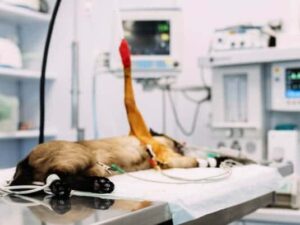
Menu


£255.00 Ex VAT
Start: 3rd February 2025
CPD: 15 hours (UK), 15 points (AUS, NZ) over 6 / 8 weeks
Level: Intermediate
This CPD course is aimed at veterinary nurses working in general practice
Nurses at both general practice and referral level will commonly nurse patients with endocrine disease throughout their career. Understanding the basic concepts of endocrinology means nurses can apply knowledge to their care in order to better support their patients.
Having an understanding of the pathophysiology of common endocrine diseases, as well as the tests performed means that we can become a useful support in clinical decision making, which subsequently improves job satisfaction and allows us to nurse to our full potential.
Each week we will look at a different endocrine disease in the cat or the dog. Following the course you will have refreshed your underpinning knowledge of the endocrine system in the canine and feline patient to include the chemical messenger and feedback systems, the types of endocrine diseases commonly affecting our patients, the tests we use and how these diseases impact our nursing care.
Learning objectives
After completion of this week, participants should be able to:
Learning materials this week:
(released on Monday morning for on demand learning until the course ends – approximate timings)
Learning objectives
After completion of this week, participants should be able to:
Learning materials this week:
(released on Monday morning for on demand learning until the course ends – approximate timings)
Learning objectives
After completion of this week, participants should be able to:
Learning materials this week:
(released on Monday morning for on demand learning until the course ends – approximate timings)
Learning objectives
After completion of this week, participants should be able to:
Learning materials this week:
(released on Monday morning for on demand learning until the course ends – approximate timings)
Learning objectives
After completion of this week, participants should be able to:
Learning materials this week:
(released on Monday morning for on demand learning until the course ends – approximate timings)
Learning objectives
After completion of this week, participants should be able to:
Learning materials this week:
(released on Monday morning for on demand learning until the course ends – approximate timings)
The course will be fully tutored by Gina Parkes and will consist of 15 hours of CPD given in various formats, including tutorials, tasks, case scenarios, forum discussions and quizzes. This course is tutored for 6 weeks, followed by a two week extension of untutored ‘catch up’ time, before the course officially ends.
All delegates will then have unlimited lifetime access to the learning material for future reference
Gina Parkes DipAVN(Small Animal), PgCert Vet Ed, FHEA, RVN
Head Medicine Nurse, Royal Veterinary College
Gina qualified in Northern Ireland in 2008 and found a passion for nursing in teaching hospitals at the University of Melbourne. She returned to the UK and joined the Royal Veterinary College as the Senior Medicine Nurse in 2011. She won best clinical abstract presented by a nurse at BSAVA in 2015 and became the Head Medicine Nurse in 2016. She completed her PgCert in Veterinary Education in 2018 and has a passion for infection control, endoscopy and endocrinology.
This online course is worth 15 hours of CPD.
A certificate will be available from the ‘My Courses’ section, for you to download and print, once you have completed the course. A permanent record of your total CPD hours will also be recorded in your account section.
The Australian Veterinary Nurse and Technician (AVNAT) Regulatory Council has allocated 15 AVNAT CPD points to this continuing education activity.
This course is also recognised by the New Zealand Veterinary Nursing Association (NZVNA) as providing 15 CPD points.
Upon purchase you will be registered to attend the course, for 6 weeks from the start date. The course will consist of various interactive tasks and lessons, including quizzes, case studies, forum discussions and further reading material.
The course is fully tutored, with new material will be provided each Monday morning, but the onus will be on the individual delegate to ensure that all tasks are fully complete. The certificate will only be issued at the end of the course when all tasks have been accomplished. Fewer CPD hours will be awarded at the the end of the course if there are unfinished tasks or there has been no contribution to the discussion forum, for example
The course is fully flexible, and there are no weekly ‘deadlines’ – the lessons and tasks may be completed whenever is convenient for each delegate, and any live lessons with be recorded and made available later that same day. Furthermore, all the course material will be available for a further 2 weeks, to allow delegates the opportunity to catch up on missed lessons and tasks, or to take the opportunity to delve further into the suggested reading texts. Please note however, that the course will not be tutored by the speaker during these final two weeks, but the time spent will count towards your CPD hours
After 8 weeks, the course will be complete and there will be no further opportunity to gain the certificate or CPD hours, however, you will have unlimited lifetime access to the tutorials, further reading and quizzes for future reference. If you make any personal notes during the course using the ‘take notes’ app, these will be saved, along with your certificate and CPD record for permanent access in ‘My CPD’
This course has been listed as ‘Intermediate’ level
All of our courses are aimed at veterinary nurses in general practice, but everyone who works in the veterinary profession is very welcome to attend, whether you are a clinical receptionist, veterinary surgeon, student nurse or have been a qualified nurse for over 20 years!
The courses are not formally assessed for skill level, so the following CPD levels are just a rough guide to help you decide if a course may be more or less suitable:
Introduction
– maybe most suitable for qualified nurses in general practice approaching a new topic or looking for a refresher course
Intermediate
– maybe most suitable for qualified nurses in general practice along with referral / specialist nurses looking for a refresher course
Advanced
– maybe most suitable for referral / specialist nurses and highly experienced qualified nurses in general practice
You will earn 255 Pawprint Points (£25.50 website credit) when you purchase this course
Our loyalty scheme rewards you with 10% in website credit to spend on future courses. Choose pay with Pawprint Points during checkout.
Please ask your practice manager or accounts department to visit the website, register an account in their own name, and during checkout, complete the ‘delegate name’ and ‘delegate email’ sections with your personal details. We will then register you a personal account on your behalf, and transfer the course booking over to your new personal account. We will of course email you all the information you need to access this new account and your CPD course.
If you need an invoice and no other payment method is available to you, then please email [email protected] with all the following information:
Please note the following:





Excel CPD specialises in providing online CPD for veterinary nurses and technicians all over the globe. Our courses are also fully approved by AVNAT for our nursing colleagues in Australia and New Zealand.
©2009-2024 Excel CPD | Terms and Conditions | Privacy Policy
Rhianna Bogue –
Good course suitable to different levels of knowledge on the subject. Thought the pre tutorial research was a good idea to have some background knowledge before hand. Good variation of quizzes and coursework.
Rachael Leaning –
Very through, Gina is a very good speaker and easy to listen to
Hannah Park –
Very informative and well structured CPD to be done at your own pace
Alix Lancaster –
I found the course very informative. Previously, I found endocrinology boring, but now I know more about it, and I understand it more, I found it very interesting. Definitely something I’ll be getting more involved with in practice from now on.
Lisa Starr –
brilliant informative course
Emma Prouse –
The course was concise without being overwhelming
Rebecca Iredale –
Really interesting and useful course, has allowed me to re-cap and expand my knowledge. I have loved how interactive it has been and the variety of tasks presented each week. I have loved the support and involvement from the tutor.
Libby Goode –
As a newly qualified RVN I felt very overwhelmed with endocrinology but having completed this course I now feel I have a better understanding of these conditions and how I as a nurse can help these patients in practice. The course was well set out, I enjoyed the tutorials and found them very in-depth and I’m looking forward to going back over these again to consolidate my understanding. I enjoyed the quizzes and the forum discussions also.
a.miller1990 –
It was a very informative course. Well put together and tutor very knowledgeable in the area.
Michelle Dalton –
Good amount of material – great tutorials and varied methods of checking understanding. Able to contact tutor easily.